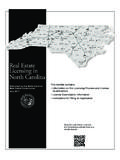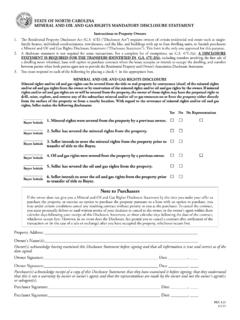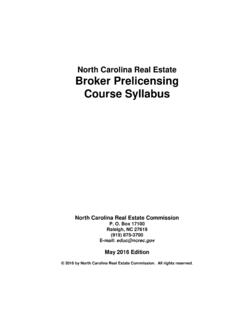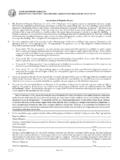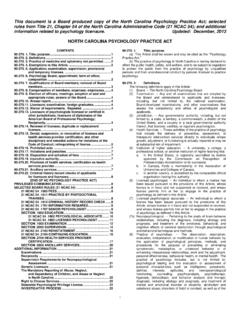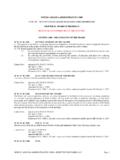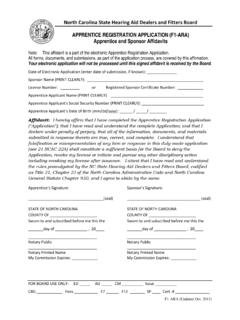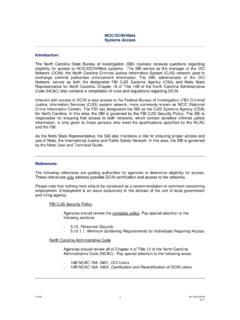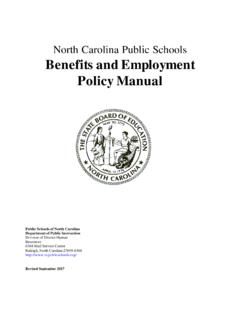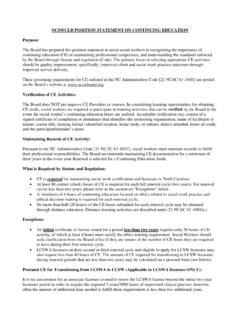Transcription of 2012-13 UPDATE C WHEN IS A PERMIT REQUIRED
1 1 2012-13 UPDATE COURSE when IS A PERMIT REQUIRED ? Outline: Introduction Recent History & Relevant Statutes when Is a PERMIT REQUIRED ? Record Retention and Duty to Discover Answers and Comments to Queries Conclusion Learning Objective: Upon completing this Section, licensees should have a better understanding of what repairs, additions, renovations, alterations or improvements may require a PERMIT and certificate from the local inspection department authorizing the work and then verifying that the work has been properly completed. INTRODUCTION As recently as September 2011, an article appeared in REALTOR magazine in the Real Life section titled, Remodeling? Don t Forget the PERMIT . The article discussed owners who make repairs or improvements to their property either themselves or through unlicensed contractors with neither obtaining the necessary permits.
2 The article comments: ..Ignoring local approval requirements not only poses safety and legal problems but also can potentially derail an otherwise smooth PERMIT process varies widely from city to city and state to state, but the purpose of the document is the same everywhere: It offers assurance by a municipal building department that the work being done meets all safety codes. [Italics added.] The article s bottom line advice: listing agents, ask your sellers before you list the property whether they have made any upgrades, replacements, repairs etc. to the property and whether they pulled the PERMIT . If not, rectify that problem first. Failing to obtain a PERMIT when REQUIRED may result in substantial fines or being ordered to remove the offending project or incur costs to certify compliance with the applicable codes; it depends.
3 What may surprise licensees is how many seemingly minor improvements/repairs may require a PERMIT . To emphasize that virtually no job is too small, the above-referenced article concludes quoting 2 Michael Hydeck, president of the National Association of the Remodeling Industry, who observes: There are not too many jobs you don t need a PERMIT for. It s better to be safe than sorry. Both licensees and consumers might presume that new construction, of whatever type, will be properly permitted, since its construction requires the presence of a general contractor who is obligated by both law and rules to obtain all necessary permits. Nevertheless, it never hurts to ask and/or request copies of all REQUIRED permits.
4 The more troublesome area is with repairs, alterations, renovations, or additions to the property performed by the owner personally or through an unlicensed contractor. Such situations might properly be viewed as red flags by licensees who minimally should ask who performed the work, whether they are licensed, and whether all necessary permits and final certificates were obtained, as well as copies of those documents, as the owner or unlicensed contractor may not be aware that the alteration or repair REQUIRED a PERMIT . This Section will briefly review the local inspection framework, who certifies the inspectors, state law specifying when a PERMIT is REQUIRED , and will then apply the law to various fact situations.
5 RECENT HISTORY & RELEVANT STATUTES In 1957 the North Carolina General Assembly enacted legislation creating the Building code Council, which was charged with preparing and adopting a North Carolina State Building code . The General Assembly specified what the code should/could contain in 143-138 (now nearly 19 pages long!), and articulated the purpose of the code thus: All regulations contained in the North Carolina State Building code shall have a reasonable and substantial connection with the public health, safety, morals, or general welfare, and their provisions shall be construed reasonably to those ends. Requirements of the code shall conform to good engineering practice. Originally, enforcement of the code was vested in the Division of Engineering of the North Carolina Department of Insurance, which still retains enforcement responsibilities in conjunction and cooperation with local inspection officials.
6 In 1977 the General Assembly decided to impose on counties and cities the primary obligation to perform inspections to ensure compliance with applicable building codes. Counties/cities could perform this duty either by creating their own inspection department, or creating a joint inspection department with a city or another county, or contracting with another county/city to provide inspection services to the requesting county/city. The same legislation also created the North Carolina code Officials Qualification Board that was charged with regulating individuals who would be hired by local inspection departments to conduct these code enforcement inspections. [ Chapter 143, Article 9C.) Since 1985 at the latest, all counties and cities have had the primary responsibility for ensuring enforcement of State and local building code provisions either through their own Inspection Department or in conjunction with another local governmental unit.]
7 There are 100 counties in North Carolina and more than 540 incorporated cities, towns, and villages, many of 3 which have individual inspection departments as there currently are nearly 600 inspection jurisdictions in NC. For example, in the Triangle area, Wake County has its own Planning, Development and Inspections Department that fulfills the county s statutory enforcement functions for all unincorporated areas of Wake County as well as for the cities/towns of Knightdale, Rolesville, Wendell and Zebulon by agreement. The cities of Raleigh, Cary, Apex, Fuquay-Varina, Garner, Holly Springs, Morrisville and Wake Forest elected to form their own inspection departments and accept responsibility for code enforcement within both the jurisdictional limits of each municipality as well as areas over which the municipality exercises extraterritorial jurisdiction.
8 Raleigh s Inspection Department has a Construction Division that reviews construction plans and assures compliance with applicable State and local building codes for all residential and commercial construction, while its Housing and Environmental Division enforces Raleigh s minimum housing and public nuisance codes. Inspection Duties and Responsibilities State law imposes the same duties and responsibilities on both counties ( 153A-352) and cities ( 160A-412). These statutes impose on local inspection departments the duty to enforce within its territorial jurisdiction State and local laws and local ordinances and regulations relating to: 1) the construction of buildings; 2) the installation of plumbing, electrical, heating, refrigeration & air-conditioning systems; 3) the maintenance of buildings in a safe, sanitary and healthful condition; and 4) other matters that may be specified by the county commissioners or city council.
9 Both statutes impose identical responsibilities on the local inspection departments utilizing slightly different language. The statute governing counties ( 153A-352) states in relevant part: These duties and responsibilities include receiving applications for permits and issuing or denying permits, making necessary inspections, issuing or denying certificates of compliance, issuing orders to correct violations, bringing judicial actions against actual or threatened violations, keeping adequate records, and taking any other actions that may be REQUIRED to adequately enforce the laws and ordinances and regulations. The board of commissioners may enact reasonable and appropriate provisions governing the enforcement of the laws and ordinances and regulations.
10 ! code enforcement is defined as ..the examination and approval of plans and specifications, or the inspection of the manner of construction, workmanship, and materials for construction of buildings and structures and components thereof, or the enforcement of fire code ! Qualified code -enforcement official is a person who has been approved by the North Carolina code Officials Qualification Board as being qualified to engage in the practice of code enforcement. 4 ! Local inspection department means the ..agency ..of local government ..with authority to make inspections of buildings and to enforce the code and other laws, ordinances, and rules enacted by the State and local government ..which establish standards and requirements applicable to the construction, alteration, repair, or demolition of buildings, and conditions that may create hazards of fire, explosion, or related hazards.
